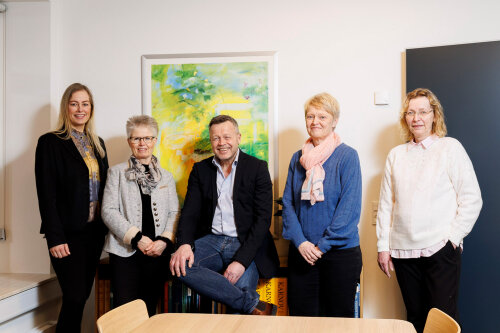Best Nursing Home Abuse Lawyers in Køge
Share your needs with us, get contacted by law firms.
Free. Takes 2 min.
List of the best lawyers in Køge, Denmark
About Nursing Home Abuse Law in Køge, Denmark
Nursing home abuse is a serious issue that impacts the well-being and rights of elderly individuals living in long-term care facilities. In Køge, Denmark, nursing home abuse can include physical harm, emotional mistreatment, neglect, financial exploitation, or deprivation of basic needs. Danish law protects nursing home residents, ensuring that all individuals are treated with respect, dignity, and care. Both the government and local authorities monitor nursing homes to uphold high standards. If abuse is suspected or identified, legal remedies are available to protect the victim and hold responsible parties accountable.
Why You May Need a Lawyer
Legal situations involving nursing home abuse can be complex and emotionally charged. In cases where a loved one is experiencing mistreatment or neglect, seeking the help of a lawyer who specializes in elder law or patient rights is often essential. Common reasons to consult a lawyer include investigating claims of physical or emotional abuse, pursuing compensation for injuries or losses, ensuring safe living conditions, escalating complaints that have not been addressed by the nursing home or authorities, and navigating disagreements over liability or the extent of harm. A lawyer can also provide guidance on dealing with insurance companies, public authorities, and court proceedings.
Local Laws Overview
Denmark has comprehensive legislation designed to protect nursing home residents. The most relevant laws are the Health Act (Sundhedsloven), the Social Services Act (Serviceloven), and the Patients' Rights Act (Lov om patienters retsstilling). These laws establish the rights of residents, required standards for care, and procedures for addressing complaints or abuse. In Køge, local authorities are responsible for supervising nursing homes, investigating complaints, and implementing corrective actions when needed. There are also mandatory reporting obligations for healthcare professionals and staff who witness or suspect abuse. Legal actions can be pursued in local courts, and compensation for damages may be awarded if abuse or neglect is proven.
Frequently Asked Questions
What constitutes nursing home abuse in Køge, Denmark?
Nursing home abuse can take many forms, including physical harm, verbal or emotional mistreatment, neglect of basic needs, financial exploitation, or any action that violates a resident's legal rights.
Who is responsible for reporting suspected abuse?
Both staff and healthcare professionals are legally required to report suspected abuse. Family members and visitors are encouraged to report any concerns to local authorities.
What should I do if I suspect abuse in a nursing home?
If you suspect abuse, document your observations and concerns, report them to the management of the nursing home, and contact Køge Municipality or the Danish Patient Safety Authority for further investigation. Consulting a lawyer may also be helpful.
How does the complaint process work?
Complaints about abuse or substandard care can be submitted to the local municipality, which must investigate. Serious cases may also be reported to the police or relevant national agencies.
What rights do nursing home residents have?
Residents have the right to safe and respectful care, privacy, autonomy, and access to medical treatment. The law also protects their right to complain and seek redress.
Can residents or families seek compensation for abuse?
Yes, if abuse or neglect is proven, residents or their families can seek financial compensation for physical injuries, emotional distress, or other losses through legal action.
Are there time limits for taking legal action?
There are statutes of limitations that set deadlines for filing civil claims. It is important to seek legal advice as soon as possible to avoid missing these deadlines.
How can a lawyer assist with a nursing home abuse case?
A lawyer can help investigate the situation, gather evidence, advise on legal options, represent you in negotiations or court, and protect the rights of your loved one.
What evidence is needed to prove abuse?
Evidence may include medical records, witness statements, photographs of injuries, reports from regulatory authorities, and documentation of complaints or correspondences with the nursing home.
Are there government agencies that help with nursing home abuse cases?
Yes, local municipalities, the Danish Patient Safety Authority, and the Ombudsman may be involved in investigating and resolving complaints of nursing home abuse.
Additional Resources
If you need assistance or want to learn more about nursing home abuse in Køge, consider contacting these resources:
- Køge Municipality Elder Services - handles oversight and complaint investigations concerning local nursing homes
- The Danish Patient Safety Authority (Styrelsen for Patientsikkerhed) - manages health care complaints and supervision
- The Danish Health and Medicines Authority - sets standards for elder care
- The Ombudsman (Folketingets Ombudsmand) - investigates complaints about public sector services
- Victims’ Helpline (Offerrådgivningen) - provides support to victims and their families
- Local advocacy organizations focused on elderly rights and support
Next Steps
If you suspect nursing home abuse in Køge, act quickly to safeguard your loved one. Begin by documenting your concerns and discussing them with the management of the care facility. File a complaint with Køge Municipality or the Danish Patient Safety Authority if the issue is not resolved. Consulting an experienced lawyer can help you understand your rights, assess your case, gather necessary evidence, and guide you through the legal process. Early legal intervention can often lead to faster and more effective resolutions, ensuring the safety and dignity of nursing home residents.
Lawzana helps you find the best lawyers and law firms in Køge through a curated and pre-screened list of qualified legal professionals. Our platform offers rankings and detailed profiles of attorneys and law firms, allowing you to compare based on practice areas, including Nursing Home Abuse, experience, and client feedback.
Each profile includes a description of the firm's areas of practice, client reviews, team members and partners, year of establishment, spoken languages, office locations, contact information, social media presence, and any published articles or resources. Most firms on our platform speak English and are experienced in both local and international legal matters.
Get a quote from top-rated law firms in Køge, Denmark — quickly, securely, and without unnecessary hassle.
Disclaimer:
The information provided on this page is for general informational purposes only and does not constitute legal advice. While we strive to ensure the accuracy and relevance of the content, legal information may change over time, and interpretations of the law can vary. You should always consult with a qualified legal professional for advice specific to your situation.
We disclaim all liability for actions taken or not taken based on the content of this page. If you believe any information is incorrect or outdated, please contact us, and we will review and update it where appropriate.










